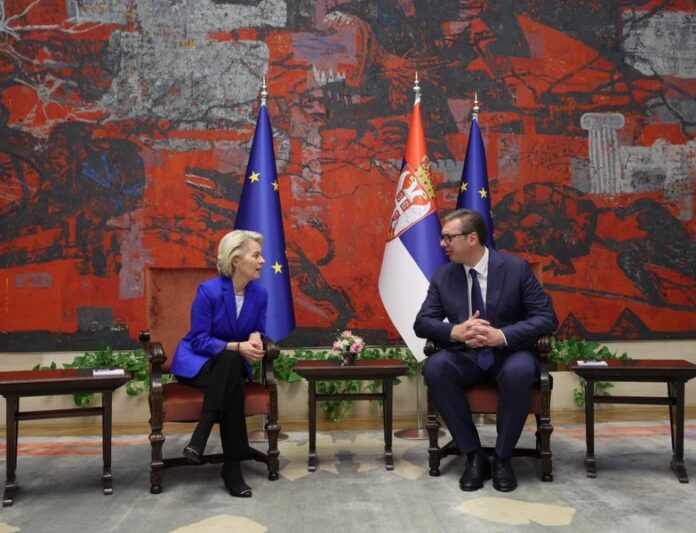Serbia is heading to snap elections in December 17, after President Aleksandar Vučić dissolved the parliament on Nov 1, as he tries to strengthen his role in order to push for EU membership.
The election will allow a delay in making decisions on Serbia’s relationship with Kosovo. The country will need to normalise relationships with Kosovo, considered by Serbia as a runaway province and not an independent state, to have a concrete path towards EU membership. The Kosovo issue is a thorny one for Belgrade, but European Commission Ursula von der Leyen reiterated on Tuesday during an official visit that both Serbia and Kosovo need to step up their normalisation efforts.
“Serbia and Kosovo must normalise relations. Vital that both urgently take steps to implement existing agreements. The EU dialogue is here to support these efforts. It’s the only way forward. To access the Growth Plan. And towards a future in which Serbia is part of the EU,” EC President posted on Twitter.
Vučić may want to run the campaign for his party, the Serbian Progressive Party (SNS) on the back of a good economic recovery, attested by a recent statement from the International Monetary Fund.
The IMF reviewed the country’s finances in order to go on with a 2.4 billion euro stand-by deal. The deal is still on, with Serbia that managed to recovery despite energy shocks and adverse conditions in its region. In addition, the IMF said that “the Serbian economy has considerable buffers against uncertainties.”
However, the IMF urged Serbia to keep up reforms aimed at stabilising electricity and gas pricing systems and adjust its tariff system in case of higher gas transit costs, saying that “forcefully pursuing a structural reform agenda centred on energy sector reforms is critical to addressing Serbia’s remaining vulnerabilities and supporting long-term growth.”
These reforms should pair with a more robust anti-corruption and crime push and as part of EU’s membership talks, Serbia should join Western sanctions against Russia. Belgrade remains one of the closest countries to Russia in Europe.
According to a Stata pollster from last month, an alliance led by Vučić’s party SNS is poised to win around 44% of votes, needing to form an alliance to govern. Behind them, the centre-left Against the Violence alliance should reach 38% of votes, while the ultranationalist and pro-Russian parties jointly have 11% of votes.
Current president Vučić was re-elected to the role in 2022 for a second five-year term. Since then, he resigned from ruling the party but he is still seen as very influential.
The new election for the 250-seat parliament on Dec 17 will coincide with local elections in 65 municipalities across the country, including the capital city Belgrade.

